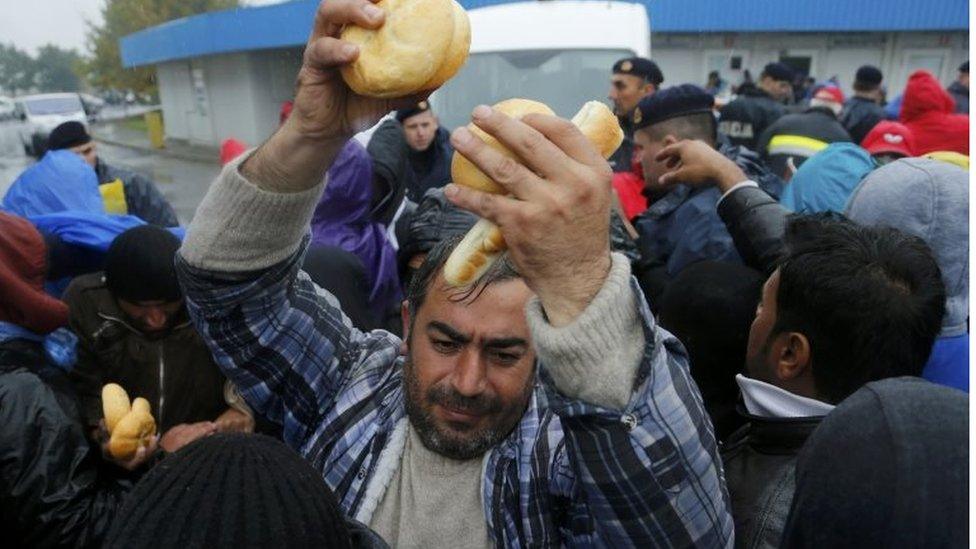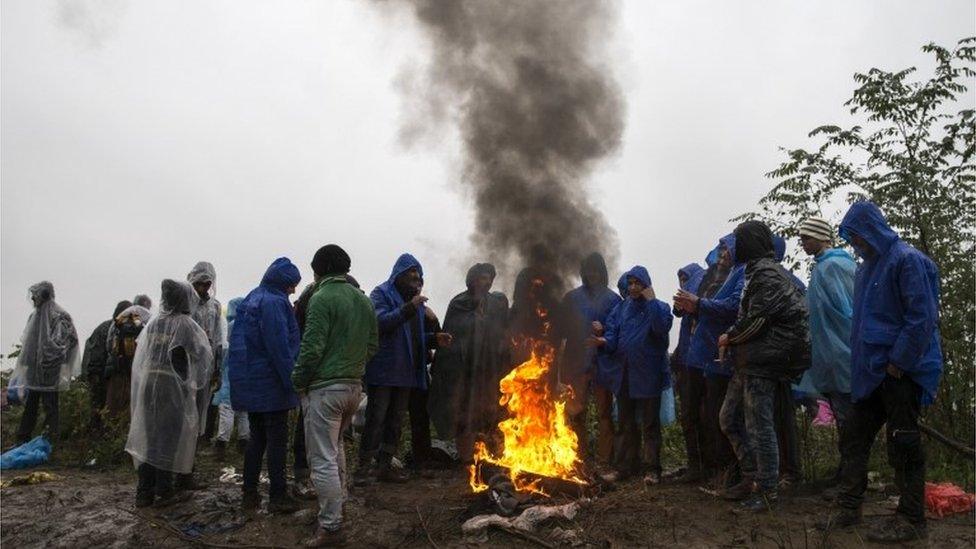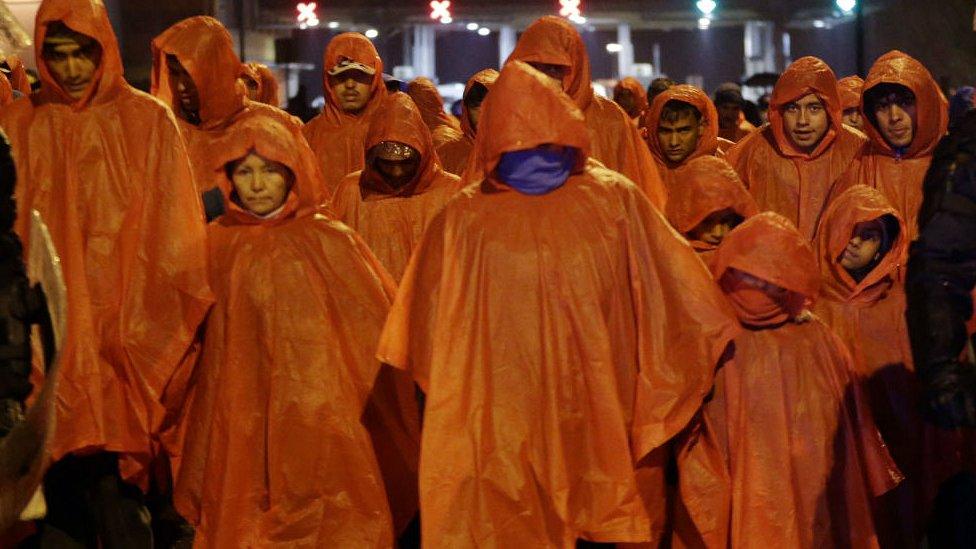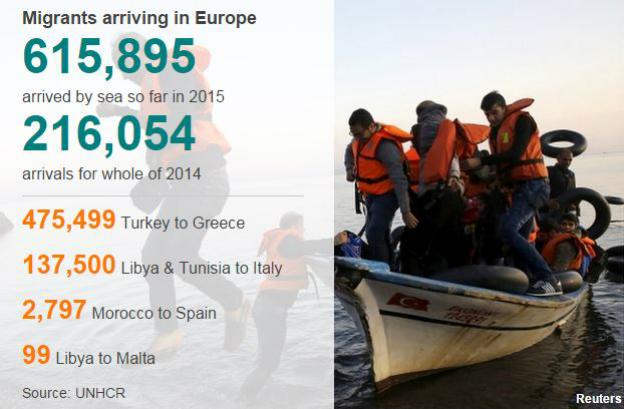Migrant crisis: Thousands stranded at Balkan borders
- Published
Guy Delauney: "These are people just caught in politics between the countries"
Thousands of migrants have been stranded at borders in the Balkans, in cold and wet conditions, as their options for travelling north shrink.
Several hundred, including young children and babies, spent the night in the open at Croatia's border with Slovenia.
The UN refugee agency (UNHCR) also complained of a lack of basic supplies at the Serbia-Croatia border.
The western Balkan route has been squeezed by government restrictions.
Hundreds of thousands of migrants, many from Syria, Africa and Afghanistan, have been making their way from Turkey to the Balkans in recent months, in a bid to reach Germany, Sweden and other EU states.

Slovenia decided at the weekend to restrict the numbers crossing its territory to 2,500 a day, in response to what it said was Austria's new policy of cutting the numbers entering its territory.
However a spokesman for the Austrian interior ministry told the BBC that there were no specific limits on the number of people allowed in each day.
On the Croatia-Slovenia border, 500 people spent the night in the open at Trnovec.
A further 1,800-2,000 slept on a train held on the Croatian side of the border. Officials told them they could stay temporarily in Croatia or try to make their own way into Slovenia.

Hundreds spent the night out in the open at Trnovec on Croatia's border with Slovenia

Guy Delauney, BBC News, Trnovec, Slovenia
The small border crossing at Trnovec became a picture of human misery, with hundreds stranded in no man's land in bone-numbingly cold rain. They had arrived in the early hours of Monday - but found a line of police and barriers blocking their way into Slovenia.
Authorities and aid agencies seemed completely unprepared. There were no tents or shelter of any kind for the migrants - who included a large number of young children and babies.
People pulled branches from trees to light fires and turned a rubbish skip on its side for a little protection from the elements.
When the Red Cross belatedly arrived, they persuaded Croatian police to allow people to shelter under the border crossing's metal canopy. But with little sign of being allowed through to Slovenia or even back into Croatia, a chant of "You kill us" started echoing around the facility.
"Shame on whoever is responsible for this," on Syrian man told the BBC. "I wish I could go back to Syria," said a young woman.
No-man's land: Border closures leave thousands stranded
The pull of Europe: Five migrant stories
Merkel under pressure: Chancellor's migrant policy faces criticism at home
Crisis in graphics: Migration numbers explained

A spokesman for Slovenia's interior ministry, Bostjan Sefic, accused Croatia of ignoring its pleas to limit the numbers crossing the border.
"The Republic of Croatia is not listening to any of our requests," he said. "This is totally unacceptable. We cannot by ourselves prevent the arrival of migrants."
Croatia's Interior Minister Ranko Ostojic rejected the accusation and said the Slovenes kept changing the numbers of migrants they were willing to take in.
Hungary, citing security concerns, has closed its borders with Serbia and Croatia, forcing migrants to switch to a slower route via Slovenia.

More than 10,000 migrants are now stranded in Serbia, barred from entering Croatia, according the UNHCR.
At Berkasovo, near the border with Croatia, more than 3,000 people are amassed at a tiny transit camp. UNHCR spokeswoman Melita Sunjic described conditions there as "dire".
"We have a lot of small children. We have disabled people, we have people who got sick on the road," she told the BBC.
"This is not a place for people, they can't sleep - they can just stand upright in the mud. We have to find another solution."

The Serbia-Croatia border at Berkasovo is another bottleneck

Rain and cold are making conditions worse
The International Migration Organization said on Monday that arrivals to Greece from Turkey were continuing at a rate of about 5,000 a day.
Germany's welcome for Syrian migrants continues to create internal political tensions.
The Pegida organisation, which campaigns against immigration, says it expects tens of thousands to demonstrate in the eastern city of Dresden on Monday evening.
Interior Minister Thomas de Maiziere has described Pegida as "hard-right extremists".
More than 600,000 people, most of them Syrians, have reached Europe so far this year compared with just over 200,000 for the whole of 2014
Germany has said it expects 800,000 asylum seekers this year, but it is believed the number could be as high as 1.5 million.
Migrants arriving in Europe
615,895
arrived by sea so far in 2015
216,054
arrivals for whole of 2014
-
475,499 Turkey to Greece
-
137,500 Libya & Tunisia to Italy
-
2,797 Morocco to Spain
-
99 Libya to Malta

A note on terminology: The BBC uses the term migrant to refer to all people on the move who have yet to complete the legal process of claiming asylum. This group includes people fleeing war-torn countries such as Syria, who are likely to be granted refugee status, as well as people who are seeking jobs and better lives, who governments are likely to rule are economic migrants.